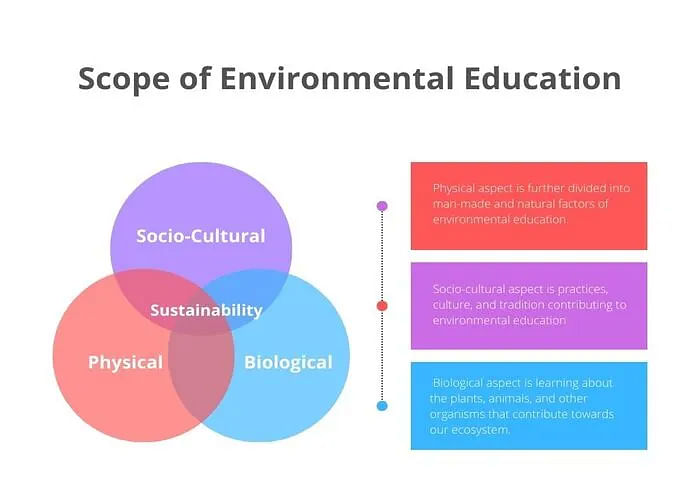Environmental education aims at the study of the natural environment. It also enables the individuals to explore, understand and resolve problems in the ecosystem. This induces people to work towards the betterment of our environment.
Environmental Education is a way through which individuals investigate environmental issues to take appropriate, required, and immediate actions to improve the conditions or any hitches in the environment. It involves the candidates to observe, understand and manage the enviourmental changes effectively to solve the enviourmental issues.
It allows individuals to develop much deeper understanding of environmental issues and drastic changes in the behaviour of the ecosystem. Knowing the nuances of environmental issues enables them to make responsible decisions towards the betterment of the environment. It is very important for our society to make an environmental saving prospective which can take major decisions on time and save the environment when in need.
What is Environmental Education?
Environmental education is defined as the field of study which consists of organized efforts put together to understand and teach how natural environments function. It also deals with studying how human beings manage their behaviour and ecosystems to live sustainable lives.
Environmental education is a multidisciplinary field that includes ideas and concepts from various fields like biology, chemistry, physics, ecology, earth science, atmospheric science, mathematics, and geography.
Also Read: Indian Education System vs Foreign Education System
Objectives of Environmental Education 2026
The primary objective of environmental education is to make people aware of the environment and its associated problems. The study involves knowledge, skills, motivation, attitude, and commitment to work individually and collectively towards solutions to current problems.
There are various objectives that the study of environmental education tends to achieve. Given below are the objectives of environmental education.
1. Awareness
Awareness is one of the fundamental objectives that any subject of study offers. Through environmental education, awareness about the environment, the issues of the environment, and the solutions for the problems are generated.
In addition, there is a proper understanding as to why there are various functions present in the environment.
2. Knowledge
Environmental education helps a person gain knowledge and information about the current happenings in the environment. There is in-depth and proper education that is provided about the environment and the factors of the environment.
3. Responsibility
It is only when we understand the reasons behind the disruptions in the environment that we can take proper steps to prevent them.
Individuals understand which activities harm the environment, be it small or big, and take necessary precautions to face the adversities. It also helps in taking any future actions and decisions responsibly.
4. Participation
When we dive deeper into a particular subject, we tend to get more involved in it. The environment concerns us all, so we must save the environment and prevent it from being harmed.
Through environmental education, individuals are encouraged to partake in saving and taking care of the environment as they become aware of the harm they can cause to their lives.
5. Creating New Patterns
With increased awareness of the harm that man's actions are causing to the environment, environmental education aims to create a new behaviour pattern and attitude towards the environment.
This results in less harm as the new pattern is aimed at being environmentally friendly.
6. Understanding the Complexity of Environment
The environment that we humans live in is complex and involves various activities that happen within it. Environmental education aims to make people understand the complexity of working in the environment and the process that occurs in it.
By understanding this, people become more indulged in saving and protecting the environment.
Scope of Environmental Education 2026
Environmental education has a wide scope as it is one of the most important areas of study. People need to understand their duties and responsibilities towards the environment.
The scope of environmental education can be better understood by exploring the top 10 benefits of Environmental Education 2026, which highlight how it shapes individuals and communities into more responsible, informed, and eco-conscious citizens.

1. Biological Aspect
The most important aspects of environmental education are biological aspects. The best example is human beings. Other examples of biological aspects include animals, birds, insects, microorganisms, and plants.
2. Physical Aspect
The physical aspect of environmental education is further divided into natural and man-made aspects. Physical aspects include air, water, land, climate, etc.
On the other hand, man-made aspects include roads, highways, airports, railroads, buildings, bridges, dams, reservoirs, etc., which humans make.
3. Socio-cultural Aspect
These are the practices, cultures, and traditions which humans make to live in a society. It can include rules, laws, religious beliefs, etc. Human beings, with their efforts, have created these.
Benefits of Environmental Education 2026
Environmental Education is the way to teach students about the importance of the environment in our lives. It is the procedure to allows individuals to learn the issues of the environment in detail, solve the problems, and try to improve the environment. Similarly, work education plays a vital role in equipping students with practical skills and encouraging them to participate actively in socially useful, productive work.
Some of the benefits or components of environmental education on an individual life is provided below.
- Exuberance and Creativity are Increased: It is an interactive learning process which improves the imagination level of individuals and helps them become more creative. When environmental education is integrated into the curriculum students tend to be more enthusiastic and engaged in learning which raises their achievement level in core academic areas.
- Education Goes Beyond the Classroom: Environmental education not only provides experimental learning to the students outside the classroom, it also provides students with the opportunity to interact with the real world, build connections, and apply their experiments. It helps the students to learn and analyse the social, ecological, economic, cultural, and political issues and interconnections in society.
- Development of Critical and Creative Thinking Abilities: Environmental Education helps the candidate to learn, research, and experiment the things happening, such as, how, why, when, where, etc. It makes them learn things and their factors in detail to find a solution to the problem. By enhancing the creative thinking and experimenting skills of students, it helps individuals in decision-making, problem-solving, and many more factors.
- Understanding and Tolerance are Encouraged: It encourages students to delve deeper into the issues causing environmental degradation and also understand the entire process. It also encourages understanding between students when they are promoted to work in collaboration regarding the issue. Students get to patiently listen and think over each other views and work on them collectively.
- Teachers and Students both are Empowered: Incorporating Environmental Education learning practices as extracurricular activities will not only empower students but also teachers. It will encourage them to develop their skills and environmental knowledge. This practice will also help to strengthen the teacher-student bond, as they collectively are engaged in an entirely new process which is more of active learning and advancement.
- Multiple Subjects meet both State and National Learning Standards: Incorporating Environmental Education learning at the state and national levels shall also prove to be a healthy intake among students as this will aware them of the outer consequences of the same. Taking a step ahead and connecting students with nature on a broader aspect shall provide an excellent backdrop for interdisciplinary learning.
Importance of Environmental Education
Every human on this Earth has a role to play for the environment, and it gives us everything we need- shelter, food, water, recreation, etc. The points given below will help in understanding the importance of environmental education.
- Environmental education is the study of the environment and its functions, the students develop a sense of understanding of the environment in the early stage of their life.
- It is important to increase the awareness of individuals about the environment to save the natural resources.
- It polishes the ability to make decisions and is strengthened with environmental education as people become more responsible and aware.
- Individuals can deal with any environmental problem through the education.
- Environmental education develops sensitivity towards the environmental issues that have been happening for a long time.
- Students will know the particular viewpoint to advocate towards environmental education.
- It makes an individual rich in the knowledge of the environment to make quick and smart decisions to save it.
Conclusion
For students who want to take this learning further, you can explore the BSc Environmental Science course, a comprehensive program that dives deeper into ecological studies, sustainability, resource management, and environmental impact analysis. It’s a great step toward building a career in environmental conservation, policy, or research, while actively contributing to the health of our planet.
In short, environmental education builds a strong foundation of knowledge, awareness, and responsibility—turning individuals into thoughtful and informed stewards of the Earth.
-
Investigates environmental issues to prompt action. -
Focuses on understanding and managing environmental changes. -
Enables responsible decision-making for a better environment. -
Multidisciplinary field including biology, chemistry, and ecology.









